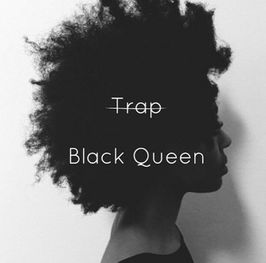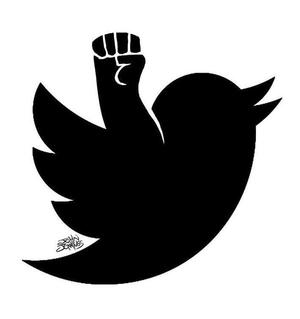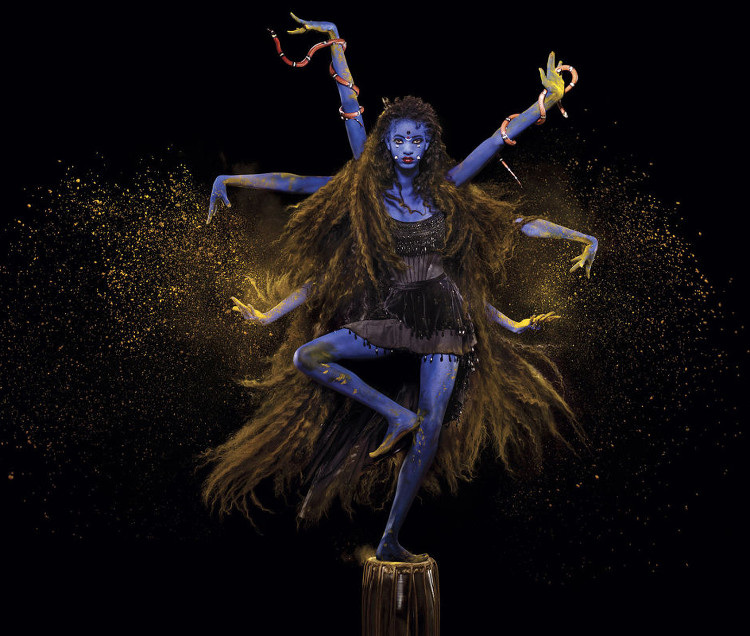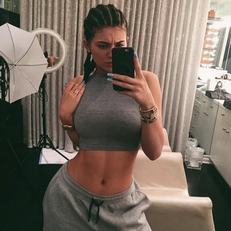"I love black social media. Black Twitter, Black Tumblr, and Black Instagram collectively decide cultural trends among so many young people of all ethnicities. Without my involvement in black social media, I doubt that I would be as aware of race relations and black identity in America, and I am definitely not the only person that can say this. However, like any big community or movement, it is bound to be flawed." - Kaila Cherry
In the beginning of freshman year, I made an Instagram account: @black.teletubby. A month prior, the American public was shaken by the murder of 18 year old Michael Brown in Ferguson, Missouri at the hands of a white police officer. The story was plastered on every news channel, website, and social media platform possible. At the time, I was an avid Tumblr user. While the topic of police brutality was receiving an immense amount of attention, I was reblogging links to Huffington Post articles, as well as people’s personal opinions on the matter that I agreed with. I was unaware that I had become a part of an emerging black social media movement. Day after day, I dedicated my time to becoming “woke,” which Urban Dictionary defines as, “Being aware... knowing what’s going on in the community (Relating to Racism and Social Injustice).”
So when I made my Instagram, the majority of my early posts talked about the injustices happening within the black community. I loved it. I felt like I was educating people and connecting with other people of color who could relate to the struggle of oppression. However, as time went on, my radical Instagram posts became less frequent. Additionally, I started to distance myself from online black communities on Twitter and Tumblr. The shift was partly due to how stressful it was arguing with racist white people. However, another big factor that led to my unhappiness with pro-black social media was some of the negative culture that black folks themselves started to implement. As I followed more and more pro-black social justice accounts, I realized that they weren't as inclusive as I had previously thought.
So when I made my Instagram, the majority of my early posts talked about the injustices happening within the black community. I loved it. I felt like I was educating people and connecting with other people of color who could relate to the struggle of oppression. However, as time went on, my radical Instagram posts became less frequent. Additionally, I started to distance myself from online black communities on Twitter and Tumblr. The shift was partly due to how stressful it was arguing with racist white people. However, another big factor that led to my unhappiness with pro-black social media was some of the negative culture that black folks themselves started to implement. As I followed more and more pro-black social justice accounts, I realized that they weren't as inclusive as I had previously thought.
Let’s make one thing clear before I get into this topic: I love black social media. Black Twitter, Black Tumblr, and Black Instagram collectively decide cultural trends among so many young people of all ethnicities. Without my involvement in black social media, I doubt that I would be as aware of race relations and black identity in America, and I am definitely not the only person that can say this. However, like any big community or movement, it is bound to be flawed.
A huge issue within pro-black social media that I noticed are that people are constantly contradicting themselves. I find this particularly apparent with issues of cultural appropriation. Cultural appropriation is “the adoption or use of elements of one culture by members of a different culture.” The term has a negative connotation, and usually refers specifically to white people taking style, music, religion, etc., from marginalized cultures—and trying to take ownership for said part of that culture. Pro-black social media is known to criticize white celebrities, high fashion, and the media for reinforcing cultural appropriation. A popular target for this is Kylie Jenner, along with the other Kardashians. This is due to taking traditionally black hairstyles, like cornrows, and doing controversial photoshoots that some find offensive.
However, in July of 2015, fourteen-year-old Willow Smith did a photoshoot in which she posed as Kali, a Hindu goddess. Outside of that, Willow Smith often sports bindis, which are usually worn by Hindu women. Willow is known to be quite spiritual, but she nor anyone in her family has said that they practice Hinduism. There is so much attention on the Jenner’s and Kardashian’s use of cultural appropriation. However, when the Willow story broke, very few people talked about it. In the rare moments I did see people people talking about it, they were all in defense of her. “Willow is young, Willow is a child…” etc. If being young is meant to absolve a person from being fully responsible for their actions, why would the same people defending Willow Smith slander Kylie Jenner (age 17 at the time) for wearing cornrows or dreadlocks? Why is it suddenly justifiable when a black person takes from another culture, but absolutely forbidden for a white person to do so? To me, enforcing that kind of double standard could make pro-black social media look less credible, because it makes seem like we don’t know exactly where we stand.
A huge issue within pro-black social media that I noticed are that people are constantly contradicting themselves. I find this particularly apparent with issues of cultural appropriation. Cultural appropriation is “the adoption or use of elements of one culture by members of a different culture.” The term has a negative connotation, and usually refers specifically to white people taking style, music, religion, etc., from marginalized cultures—and trying to take ownership for said part of that culture. Pro-black social media is known to criticize white celebrities, high fashion, and the media for reinforcing cultural appropriation. A popular target for this is Kylie Jenner, along with the other Kardashians. This is due to taking traditionally black hairstyles, like cornrows, and doing controversial photoshoots that some find offensive.
However, in July of 2015, fourteen-year-old Willow Smith did a photoshoot in which she posed as Kali, a Hindu goddess. Outside of that, Willow Smith often sports bindis, which are usually worn by Hindu women. Willow is known to be quite spiritual, but she nor anyone in her family has said that they practice Hinduism. There is so much attention on the Jenner’s and Kardashian’s use of cultural appropriation. However, when the Willow story broke, very few people talked about it. In the rare moments I did see people people talking about it, they were all in defense of her. “Willow is young, Willow is a child…” etc. If being young is meant to absolve a person from being fully responsible for their actions, why would the same people defending Willow Smith slander Kylie Jenner (age 17 at the time) for wearing cornrows or dreadlocks? Why is it suddenly justifiable when a black person takes from another culture, but absolutely forbidden for a white person to do so? To me, enforcing that kind of double standard could make pro-black social media look less credible, because it makes seem like we don’t know exactly where we stand.
 A ¨trap queen¨ is woman who helps guard the ¨trap¨ or a place where drugs are kept and sold.
A ¨trap queen¨ is woman who helps guard the ¨trap¨ or a place where drugs are kept and sold. Another issue I’ve noticed with some pro-black social media accounts is the inability to have a respectful debate online with someone. I used to follow a big Instagram account run by someone my age (whose name and account I will leave anonymous). This person had so many opinions about race and culture that I agreed with. Of course, when you put a controversial opinion onto the world wide web, there are going to be people who either disagree, or may not understand the topic as well as you do. The person that I followed was not very good at responding to these disagreements. They would call people names, shut them down, and ultimately end up bullying the person that respectfully disagreed with them. This is sometimes referred to as a “call out” and call-out culture is very popular in pro-black social media. Daily Beast writer Stereo Williams responded to the issue of call outs, in an article called “The Power of Black Twitter.”
Williams then goes on to say how these callouts are born out of “valid criticism.” Which is true. When I see people doing callouts, they usually are justified to an extent. However, sometimes call outs get so aggressive that the point of the post gets lost in all the arguing. A comment section can turn from educating someone about a social justice issue to a virtual cat fight. Is an fighting fire with fire is an effective way of furthering the cause?
Lastly, pro-black social media has a tendency to tear down other black people. Many accounts praise the idea of the "natural haired, politically aware, modest" black woman. Phrases such as "Be a black queen, not a trap queen" reinforce the sentiment that being associated with the ghetto is a negative and undesirable, despite so many people of color, black people in particular, growing up in that environment.
This idea of the idealized black women also allows room for slut shaming to exist. Ayesha Curry, wife of basketball player Steph Curry, has become the “model black woman” in many people’s eyes. Because she is married, has children, and she dresses “respectably”. The idea of dating an ¨Ayesha Curry¨ type is very prevalent on Black Twitter, so much so that Ms. Curry had her own controversial tweets about the matter. As a result of this, black women are placed to a higher standard than black men. This creates tension between the genders, and causes further divide of the black online community.
Black social media is just now gaining attention from mainstream news sources. From hashtags like #IfTheyGunnedMeDown, a response to how the media depicts people of color in unjust shootings as well as crimes, to the most famous sentiment #BlackLivesMatter. There is no question: Social media is a new form of protest and expression. Social media allows our voices to be heard in spaces where they otherwise would be silenced. Social media has allowed young people to learn and shape their own opinion about the society we live in, which I don’t think would be possible without pro-black social media heading the movement. However, as the pro black social media community grows, it’s important that we recognize our flaws and work to fix them now. If we don’t, we run the risk of not being taken as seriously as we could be. As a community working towards justice and equality, not being taken seriously is that last thing we need.




